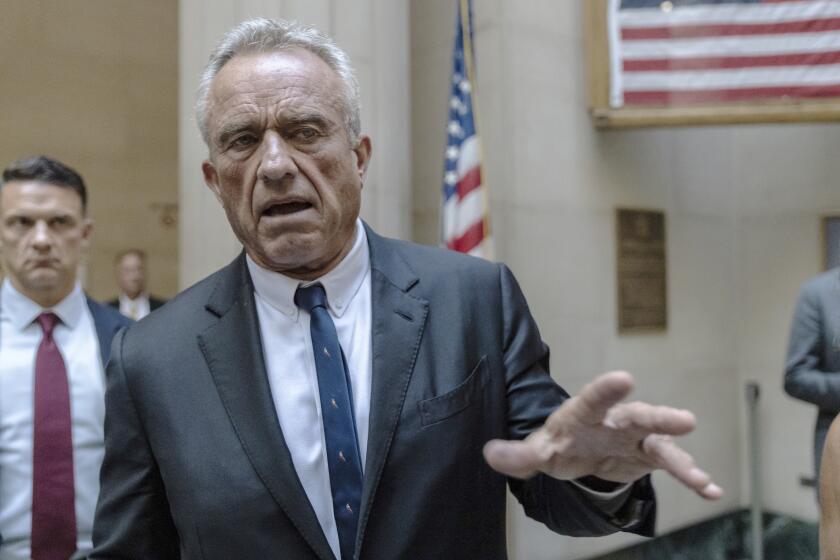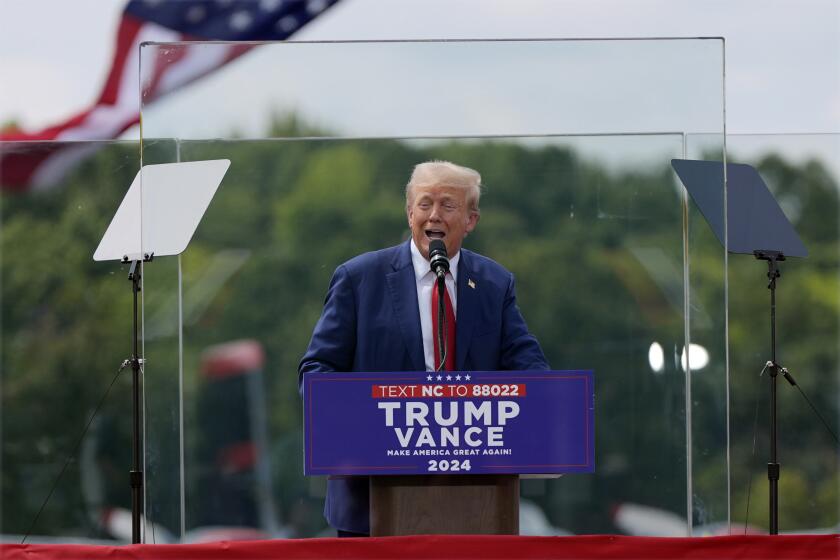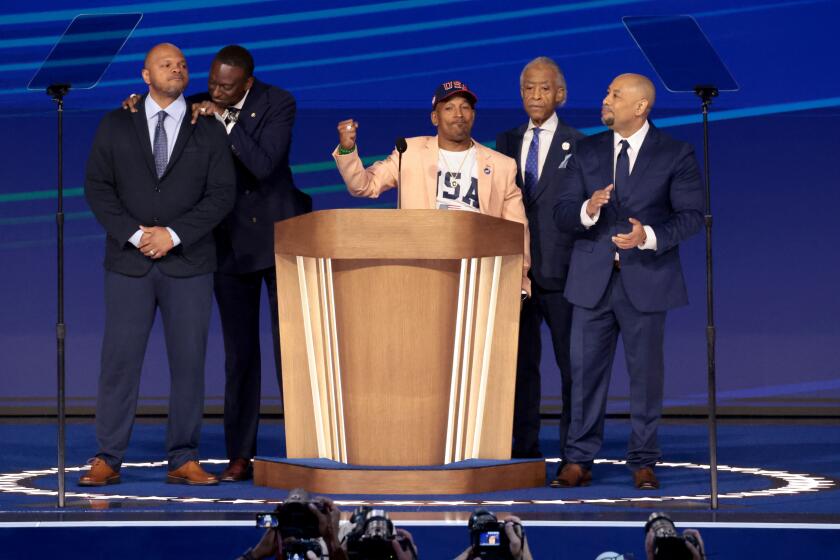Mohamed ElBaradei’s star dims in Egypt
He arrived uncorrupted and full of promise.
Mohamed ElBaradei returned to his native Egypt one year ago to lead a movement to reform the constitution. Crowds greeted the Nobel Peace Prize laureate at the airport. The ruling National Democratic Party worried for the first time in decades that its power might be threatened.
But even as Egyptians forced President Hosni Mubarak to step down Friday, the enthusiasm for ElBaradei had dwindled. The 68-year-old diplomat is viewed by many as a reluctant revolutionary, a man who inspired them but didn’t lead them into the streets against the police state.
The former head of the United Nations nuclear regulatory agency has shown flashes of courage and tenacity. On Jan. 28, he prayed outside a Cairo mosque. He then turned and walked toward barrages of tear gas and water cannon fired by riot police. It was an image Egyptians had been awaiting for months, but as quickly as it happened, he disappeared.
Some in the crowd that day kept asking: “Where’s ElBaradei?”
No one voice today speaks for the millions who brought down their government. The traditional opposition has long been divided and co-opted by Mubarak’s ruling party. Over the last three weeks, it was eclipsed by young middle-class professionals who skillfully navigated Facebook and social networking sites to rally the masses.
The opposition, from socialist parties to the Muslim Brotherhood, faces enormous challenges in the months ahead. The military controls the country and it is uncertain what kind of transitional government may emerge before new elections. ElBaradei and other opposition figures are working with activists to form a unified force. Egos and conflicting aspirations will probably make that trickier.
ElBaradei may yet become a prominent voice in the post-Mubarak era. When asked by an Austrian newspaper this month if he would consider leading Egypt, he said: “Naturally I want to play a part in the future, but who stands in the election, that’s really not so important at the moment. But if the people want it, of course I would be available.”
Right now, despite his eloquent appearances on satellite television, or perhaps because of them, he lacks resonance at home.
“His role as a leader for change in Egypt is over,” said Hassan Nafaa, former coordinator for ElBaradei’s National Front for Change. “He had the historic opportunity to represent real reforms, but his frequent travels abroad cost him credibility. He didn’t seize the moment, and now it’s a youth rebellion forcing the change ElBaradei was supposed to bring.”
In a presidential straw poll conducted last week by the Washington Institute for Near East Policy, 3% of Egyptians supported ElBaradei. That’s two percentage points better than opposition leader Ayman Nour, but well below the 26% for Amr Moussa, a former Egyptian foreign minister who topped the list. Moussa quit his post as secretary-general of the Arab League on Friday to begin what is widely seen as a campaign for president.
“I don’t think ElBaradei was ever convinced deep within himself that he was the man to lead the change,” said one opposition leader who spoke on condition of anonymity. “It became a forced marriage between him, the people and the opposition.”
ElBaradei’s journey from the Vienna-based International Atomic Energy Agency, where he served as director-general for 12 years, to this ancient capital began in 2009 when Egyptian opposition leaders called him for help. After decades of chasing disparate agendas, they saw in ElBaradei a potentially galvanizing presence to challenge Mubarak.
“Who else do we have better than ElBaradei to lead Egypt through a transitional period or even beyond it?” said George Ishak, a longtime opposition figure. “No one.”
ElBaradei has negotiated with some of the world’s toughest regimes, including Saddam Hussein’s Iraq, Mahmoud Ahmadinejad’s Iran and Kim Jong Il’s North Korea. But diplomatic finesse and moral arguments did little to budge an Egyptian government criticized for repressing political expression with torture and mass arrests.
His strategy against Mubarak had been to propel a mainstream movement for political freedom and constitutional reform to make it easier for independent candidates to run for office. Petitions were signed, small rallies held, Twitter updates sent. The ruling party lost its fear of ElBaradei, however, when it became apparent he would not take to the streets.
ElBaradei declined to be interviewed for this article. He has often referred to himself as an “agent for change” rather than a political leader. He was reluctant to embrace demonstrations because he feared that Egyptians’ historically low turnout would hurt his movement’s legitimacy.
His habit of traveling back and forth between homes in Vienna and Cairo had long angered activists, who considered him too detached. But when hundreds of thousands of demonstrators marched Jan. 25, he was convinced that his countrymen were committed to overthrowing the government. He returned to Egypt to push a plan for a three-member transitional governing council.
“He just arrived from abroad,” businessman Ahmed Hanna said. “What does he know about Egypt?”
ElBaradei made one appearance in Tahrir Square, the carnival of political revolt against Mubarak. There was no sound system in the square and ElBaradei, holding a megaphone, was barely heard. Demonstrators surged and engulfed him and his staff.
“He fell to the ground,” said Abdelrahman Samir, who represents ElBaradei’s National Front for Change in meetings of activists in Tahrir. “The crowd was too large.”
ElBaradei’s less-than-electrifying public appearances had been constrained by the pervasive presence of Mubarak’s police apparatus. State-run media ridiculed him as a dupe of foreign hands. Secret police and informers tailed him and harassed his advisors.
He met recently with 25 activists at his home outside Cairo, not far from the pyramids. Authorities arrested nine of them shortly afterward. Yasser Hawary, who represents a group called Freedom and Justice, said military intelligence officers handcuffed him and other activists and held them incommunicado and without charges for three days.
The police network that paralyzed much of the opposition is, at least for now, in retreat. The military’s intentions are not clear. The question is who will eventually rise through the tangle of parties and bickering voices to lead the country.
The day ElBaradei faced riot police at the mosque, he was nervous but focused, a sense of history upon him. The faces of those around him were animated; many of the people had endured batons and arrests before. Street confrontation was not the diplomat’s choice. He wore a pale blue checkered shirt and beige sweater.
Minutes later, tear gas burned his eyes, his sweater was drenched. Everyone around him knew the power of that moment: A Nobel Peace Prize laureate attacked by the state.
ElBaradei was shaken. A shrewd negotiator with a gift for sound bites, he sought refuge in the mosque, wanting to make sure cameras had captured the scene.
He returned home later that day.
Amro Hassan of The Times’ Cairo Bureau contributed to this report.
More to Read
Sign up for Essential California
The most important California stories and recommendations in your inbox every morning.
You may occasionally receive promotional content from the Los Angeles Times.








